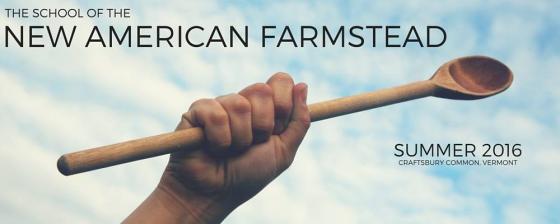Posted January 19, 2016 at 09:54am by Christian Feuerstein
Sterling College Launches “School of the New American Farmstead”

January 19, 2016 • Craftsbury Common, VT • Sterling College has launched the School of the New American Farmstead, offering a variety of classes and workshops for aspiring agrarians and artisan food makers. These hands-on short courses in small-scale food production and sustainable farming offer one-on-one mentorship, inspiration, skills, and new perspectives that will feed the body, the mind, and the spirit.
The vibrant working landscape of Vermont has been the inspiration for Sterling College’s curriculum for a half century. Sterling's sustainable agriculture and land management programs were among the first in the nation. The School of the New American Farmstead at Sterling College connects the College's mission of environmental stewardship education by linking ecological principles of land management with the entrepreneurial community-building spirit of today's artisan food movement.
“The School of the New American Farmstead offers a remarkable opportunity for students to immerse themselves in ecological farming and craft food production. They will actually roll up their sleeves and dig in or get cooking,” said Nicole Civita, Assistant Director of the Rian Fried Center for Sustainable Agriculture & Food Systems at Sterling College. “The classes are for people who are concerned about how their food is produced, those looking to switch careers, or those who simply want to give their passions for food and farming the time and space they deserve.”
She added, “The College and its classes are also located in one of the most beautiful areas of Vermont, so taking a course can be a learning vacation.”
The School of the New American Farmstead is an expansion of the College’s successful continuing education program that takes advantage of its leadership in sustainable agriculture and food systems education. The courses offered range from summer long practica in sustainable agriculture, to two-week short courses in artisan food production, to two-day single subject workshops. Students who complete six food-focused courses will be awarded a Value-Added Sustainable Food Certificate.
Subjects include charcuterie, dairy craft, fermentation, artisan bread making, harvest preservation, foraging, wildcrafting, as well as integrated agriculture, regenerative agriculture, and draft horse farming.
Visiting instructors include:
-
David Asher, guerilla cheesemaker. Asher is the author of The Art of Natural Cheesemaking and teaches dairy craft that is ecological, DIY, and well suited to the home kitchen or artisanal production.
-
Pascal Baudar, wildcrafter, self-reliance instructor, and culinary alchemist. Baudar is a certified Master Food Preserver/Food Safety Advisor who brings old world techniques and traditions to sourcing, preparing, and preserving foods found in the wilderness.
-
Andrea Chesman, preservation expert. Chesman has written The Backyard Homestead Book of Kitchen Know-How, The Pickled Pantry, and Recipes from the Root Cellar.
-
Pete Colman, the founder of Vermont Salumi. Mentored by the prosciutto makers of Umbria, Colman learned the method, techniques, and centuries-old traditions of Italian salumi-making and brought it back to Vermont. Colman also designed Vermont’s first state and USDA-approved salumi-making facility.
-
Tradd Cotter, mycologist and founder of Mushroom Mountain. Cotter is a noted microbiologist and professional mycologist, who has cultivated mushrooms both commercially and experimentally for over twenty-two years. His primary interest is in low-tech and no-tech cultivation strategies so that anyone can grow mushrooms on just about anything, anywhere in the world.
-
Darren Doherty, the founder of Regrarians Ltd. Doherty has been widely acclaimed as a pioneer in retrofitting broad-acre agricultural systems. He has conducted training in nearly 50 countries and originated the Keyline Farming Course, Carbon Farming Course, Carbon Economy Course, and more.
-
Sandor Katz, self-styled “fermentation revivalist.” Katz is the James Beard award-winning and New York Times bestselling author of The Art of Fermentation, The Revolution Will Not be Microwaved, and Wild Fermentation. Katz last taught fermentation at Sterling College in 2014.
-
Ivan Larcher, master cheese maker, cheese expert, and educator. Larcher lectures and provides technical advice to cheese makers world-wide. Larcher has been teaching at Sterling College since January of 2014, when the College and the Cellars at Jasper Hill launched the Artisan Cheese program designed to provide students the practical and scientific knowledge involved in creating small-scale artisan cheese.
-
Richard Miscovich, expert bread baker. Miscovich is the author of From the Wood-Fired Oven and the recipient of the Baking & Pastry Service Award in 2006 and 2009. He is an assistant professor at Johnson & Wales University.
-
Tao Orion, permaculture designer. Orion is the author of Beyond the War on Invasive Species and teaches permaculture design at Oregon State University and at Aprovecho, a 40-acre nonprofit sustainable-living educational organization.
The announcement of the School of the New American Farmstead caps a remarkable time of innovation and growth at Sterling College. Under the leadership of President Matthew Derr, the College has launched the Rian Fried Center for Sustainable Agriculture & Food Systems; inaugurated its continuing education program; made substantial progress on renewable energy; transformed its agricultural facilities; and set records for enrollment and fundraising.
Online registration is now open, but spaces are limited. Students are encouraged to apply as early as possible. Academic credit is available for all courses. For more information on individual courses and to register, visit www.sterlingcollege.edu/snaf.
--##--
ABOUT STERLING COLLEGE
Founded in 1958 in Craftsbury Common, Vermont, Sterling College is the leading voice in higher education for environmental stewardship. The College was among the first colleges in the United States to focus on sustainability through academic majors in Ecology, Environmental Humanities, Sustainable Agriculture & Food Systems, and Outdoor Education. Sterling College is accredited by the New England Association of Schools and Colleges and is one of only seven federally recognized Work Colleges in the nation.
MEDIA CONTACT
Christian Feuerstein, Director of Communications, Sterling College
802.586.7711 x164 • cfeuerstein@sterlingcollege.edu
